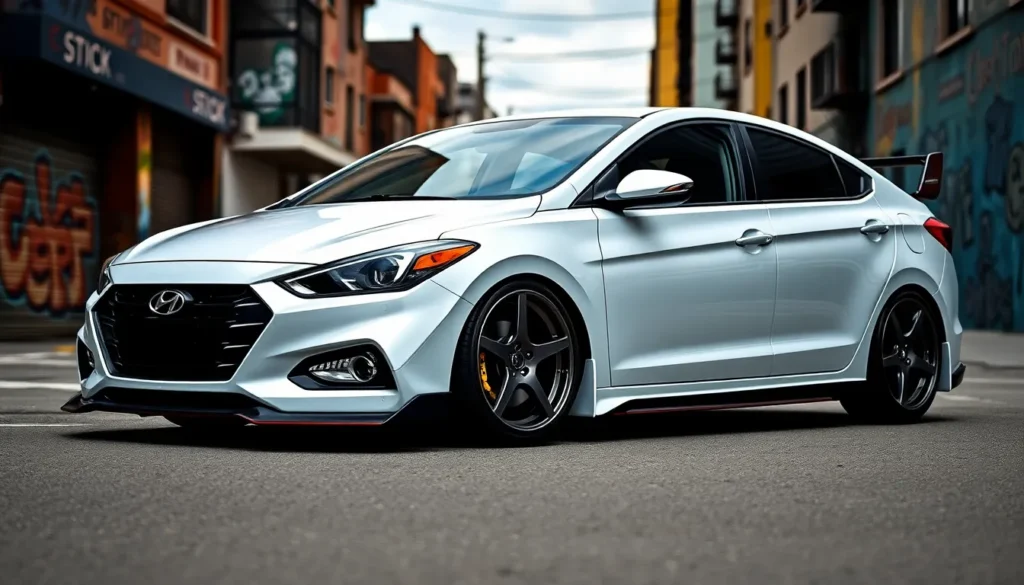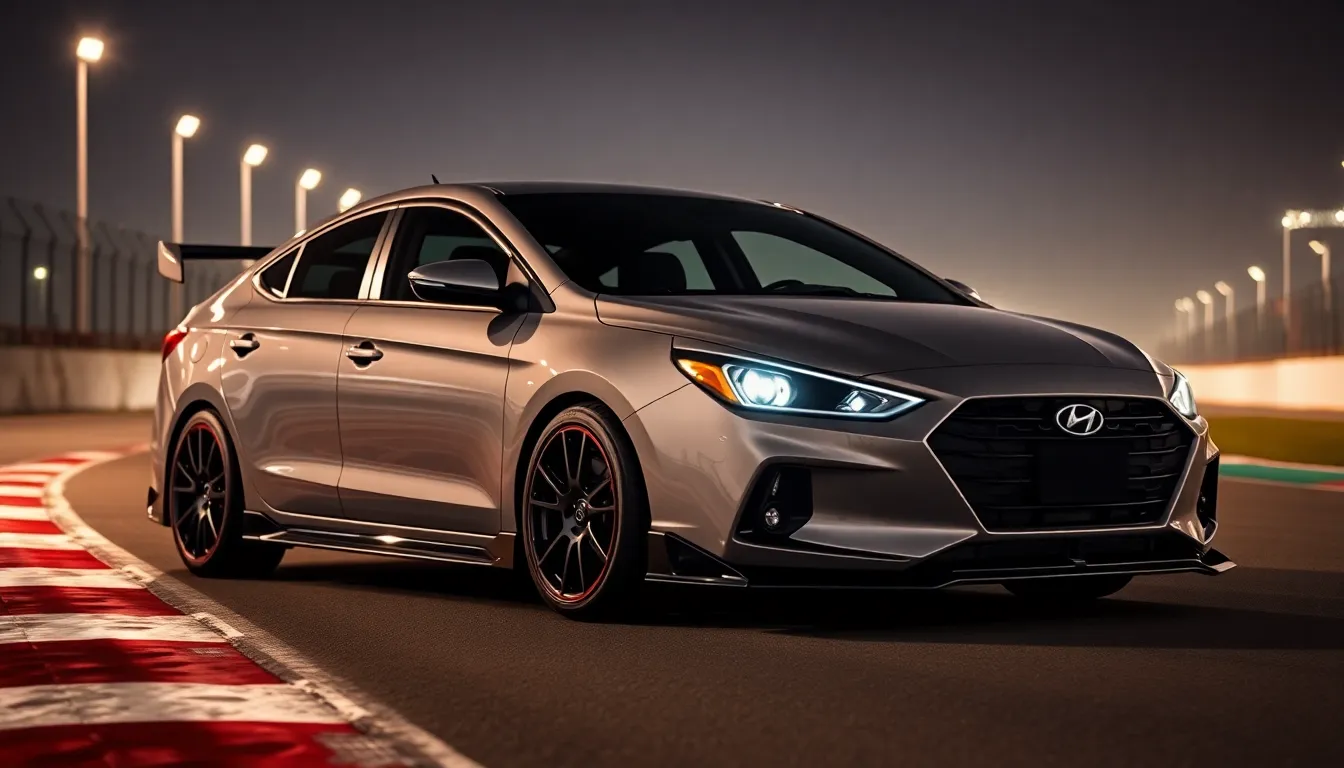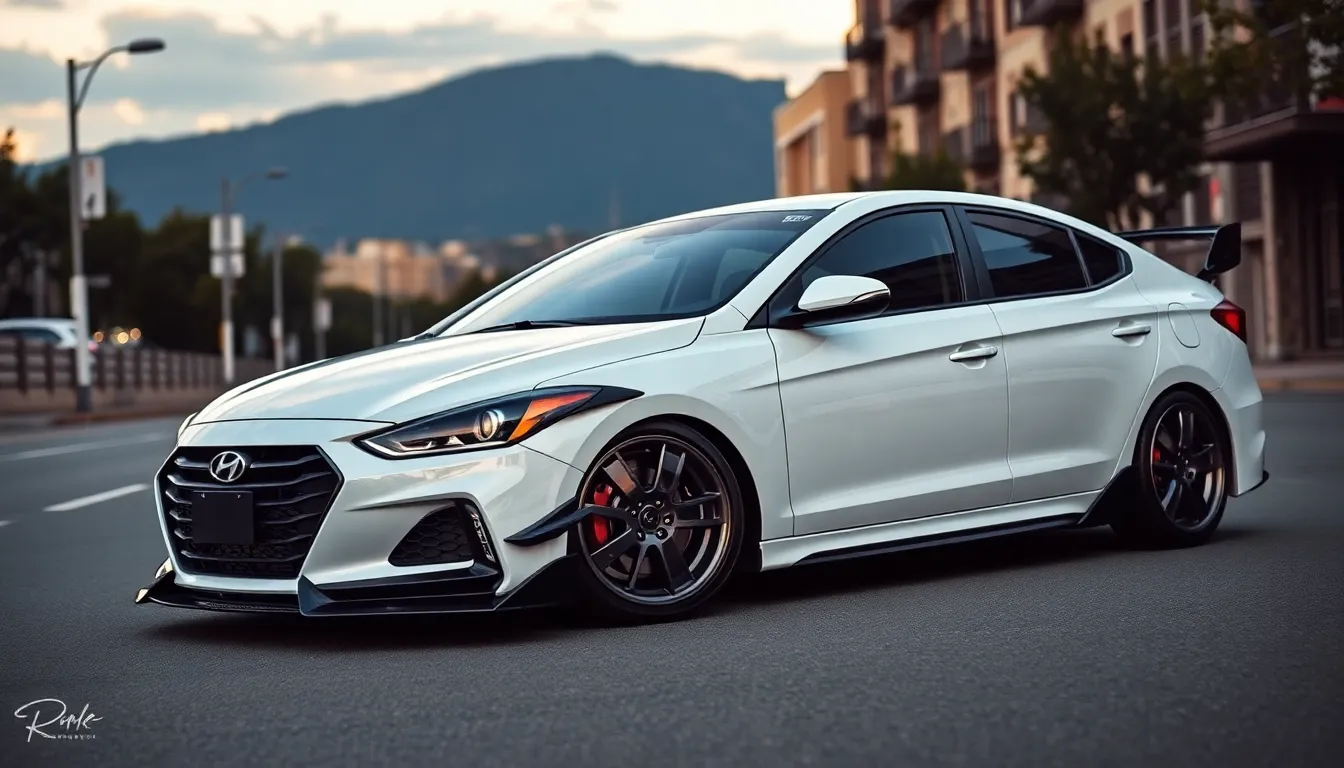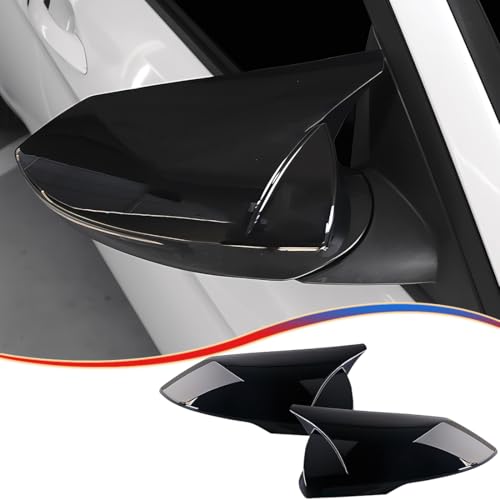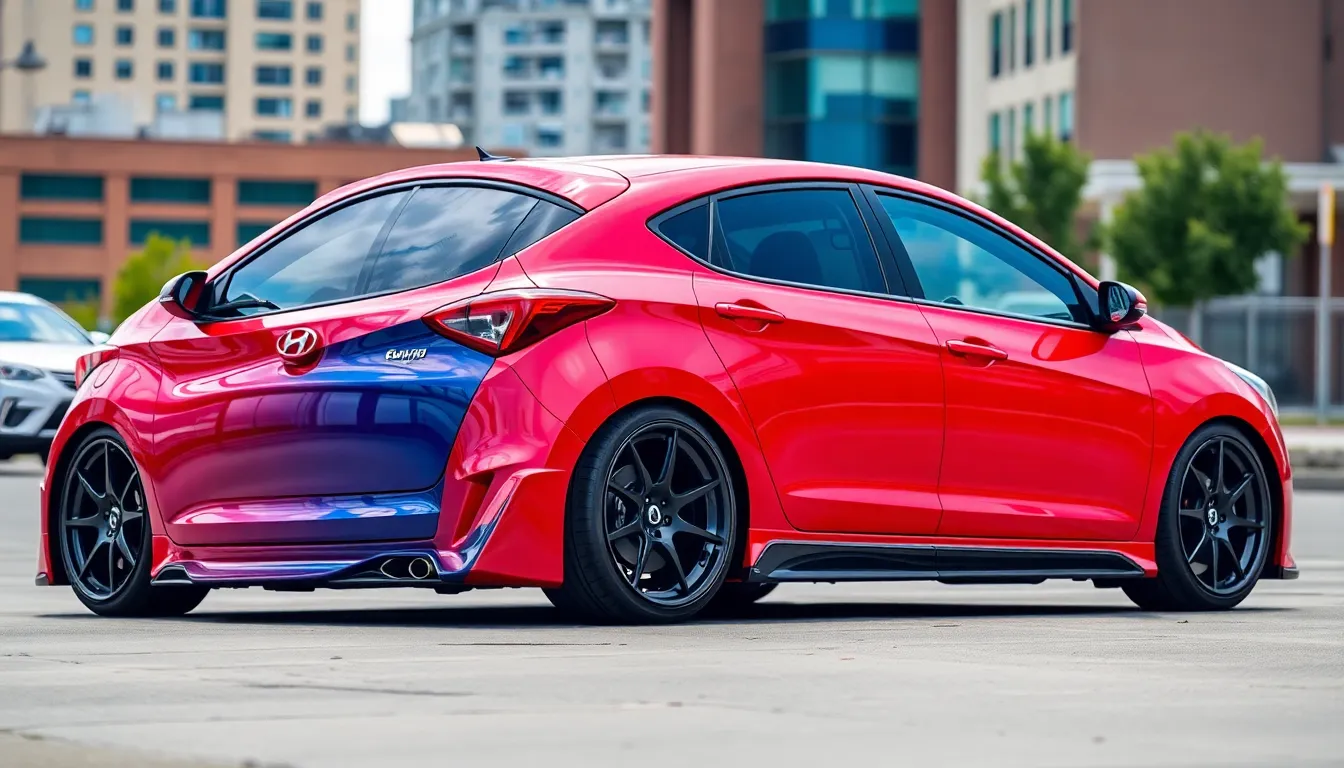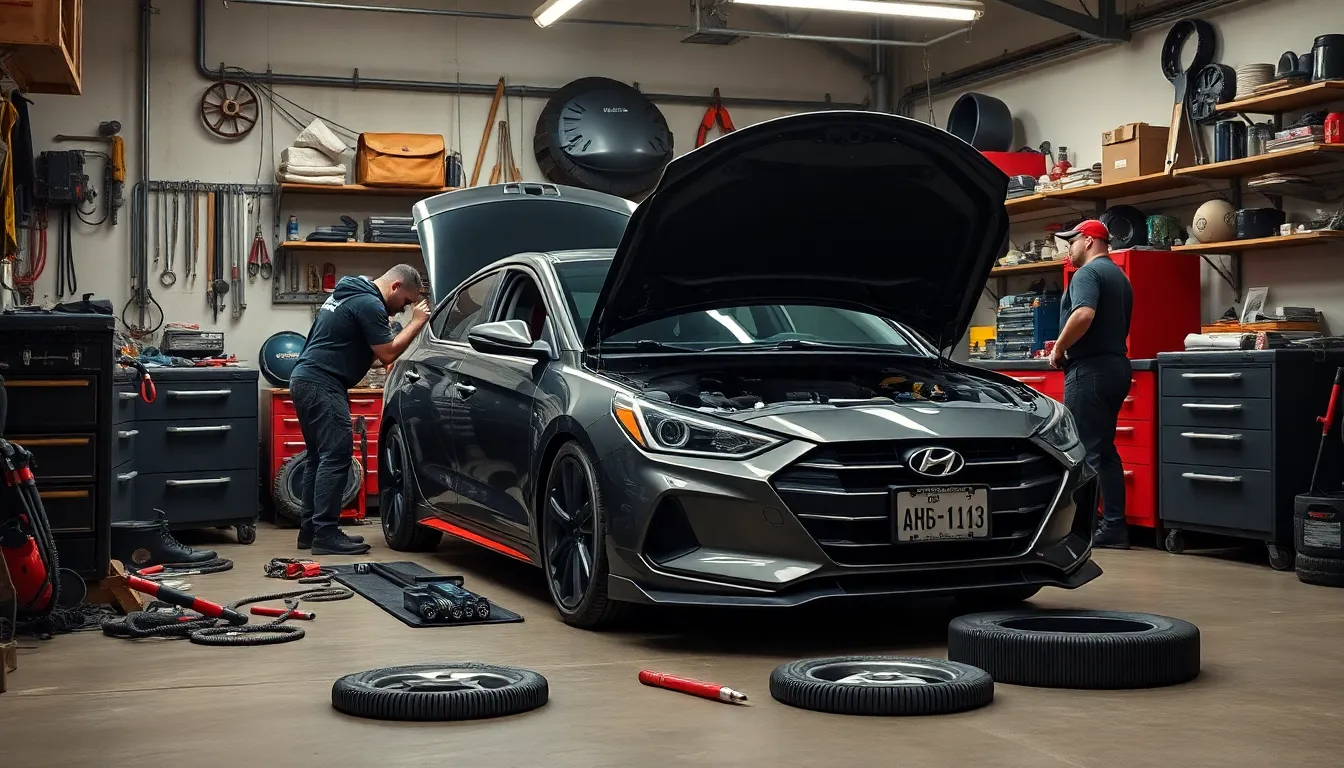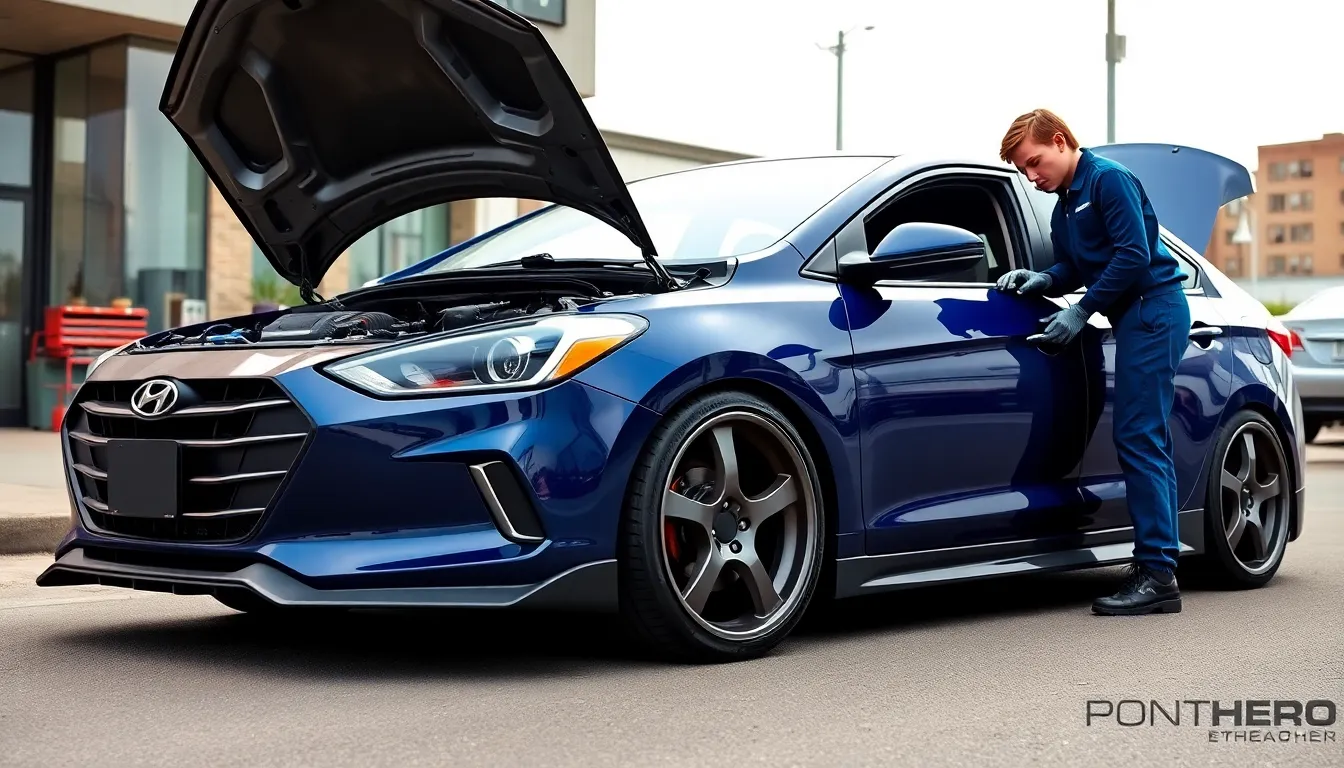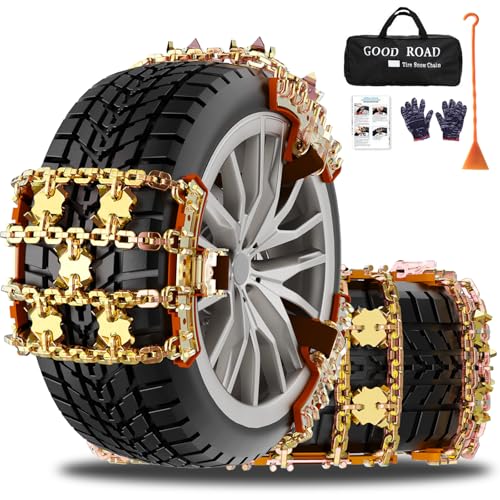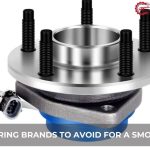The Hyundai Elantra has evolved from a simple economy car into one of the most popular platforms for automotive modification enthusiasts. We’ve witnessed countless drivers transform their Elantras into stunning custom builds that rival much more expensive vehicles.
Whether you’re looking to boost performance with turbo upgrades and suspension modifications or enhance aesthetics with body kits and custom wheels, the Elantra offers incredible potential. We’ve seen everything from subtle daily driver improvements to full track-ready builds that completely reimagine what this affordable sedan can become.
The best part? Modifying an Elantra doesn’t require very costly. With a thriving aftermarket support community and reasonable part prices, we can help you create a personalized ride that reflects your style and performance goals without the premium price tag of luxury sports cars.
What Makes the Hyundai Elantra a Great Modification Platform
The Hyundai Elantra stands out as an exceptional foundation for automotive modifications due to its accessible engineering and robust construction. We’ve observed that the vehicle’s straightforward design allows enthusiasts to carry out changes without encountering overly complex systems that plague many modern cars.
Affordability drives the Elantra’s popularity among modification communities. Entry level models start around $20,000 making the initial investment manageable for most enthusiasts. This pricing advantage leaves substantial budget for performance enhancements and aesthetic upgrades.
Strong aftermarket support has developed around the Elantra platform over its multiple generations. Companies like Injen, Borla, and Eibach manufacture exact components for various Elantra model years. We find replacement parts readily available through distributors nationwide with competitive pricing structures.
Engine bay accessibility simplifies modification work significantly. The 2.0L naturally aspirated and 1.4L turbocharged engines provide ample space for intake modifications cold air systems and exhaust upgrades. Technicians can reach most components without removing major assemblies reducing labor costs for installations.
Suspension geometry responds well to lowering springs coilovers and sway bar upgrades. The MacPherson strut front setup and torsion beam rear configuration accept aftermarket components without extensive fabrication. Performance gains become noticeable with basic suspension modifications costing between $800 and $1500.
Electronic systems remain straightforward compared to luxury vehicles. The Elantra’s ECU accepts tuning modifications through accessible OBD2 ports. Flash tuning options from companies like HPTuners work effectively with both naturally aspirated and turbocharged variants producing measurable power increases.
Build quality ensures longevity throughout the modification process. We’ve documented modified Elantras exceeding 150,000 miles while maintaining reliability with proper maintenance schedules. The platform’s durability supports both daily driving and occasional track use applications.
Popular Hyundai Elantra Modified Performance Upgrades
Performance modifications transform the Elantra from an efficient commuter into a capable enthusiast vehicle. These upgrades target the engine, suspension, and braking systems to deliver enhanced driving dynamics.
Engine Modifications and Tuning Options
Cold air intakes increase airflow by up to 15% over stock systems, delivering improved throttle response and horsepower gains of 5-10 HP. Aftermarket exhaust systems like those from Borla and MBRP reduce backpressure while adding aggressive sound characteristics.
ECU tuning through platforms like Hondata and KTUNER unlocks additional power by optimizing fuel maps and ignition timing. Turbo upgrades on naturally aspirated models can add 40-60 HP with proper supporting modifications including upgraded fuel injectors and intercoolers.
Header upgrades replace restrictive factory manifolds with free-flowing designs that improve exhaust gas velocity. Performance camshafts alter valve timing to increase power output in exact RPM ranges, particularly benefiting high-revving applications.
Suspension and Handling Improvements
Coilover systems from companies like BC Racing and Tein provide adjustable ride height and damping characteristics. Lowering the vehicle by 1-2 inches improves aerodynamics and reduces body roll during cornering.
Strut tower braces connect the front suspension mounting points to increase chassis rigidity. Anti-roll bars with larger diameters than stock reduce body roll by up to 30% during aggressive cornering maneuvers.
Performance springs paired with quality shocks offer cost-effective handling improvements without the complexity of full coilover systems. Upgraded bushings throughout the suspension eliminate compliance for more precise wheel control and improved steering feedback.
Brake System Enhancements
Big brake kits featuring 4-piston calipers and 12-inch rotors provide superior stopping power over factory single-piston designs. Companies like StopTech and Wilwood manufacture direct-fit answers that require no modifications to mounting points.
Performance brake pads with higher friction coefficients maintain effectiveness at elevated temperatures. Stainless steel braided brake lines replace rubber units to eliminate expansion under pressure, improving pedal feel and consistency.
Upgraded brake fluid with higher boiling points prevents fade during aggressive driving sessions. Cross-drilled and slotted rotors improve heat dissipation while providing consistent braking performance across varying conditions.
Aesthetic Modifications for the Hyundai Elantra
Aesthetic enhancements transform the Elantra’s conservative factory appearance into a personalized statement that reflects individual style preferences. Visual modifications create distinctive looks while maintaining the vehicle’s practical daily driving capabilities.
Body Kits and Exterior Styling
Body kits revolutionize the Elantra’s exterior profile through comprehensive styling packages that include front splitters, side skirts, rear diffusers, and spoilers. Companies like Sequence Spec, KDM Tuners, and Roadruns produce complete aerodynamic packages specifically designed for different Elantra generations, with prices ranging from $800 to $2,500 for full kits.
Front lip spoilers enhance the aggressive appearance while improving aerodynamics at highway speeds. Popular options include the Sequence front lip ($299), which adds 2.5 inches to the front overhang, and carbon fiber variants from brands like Seibon that cost approximately $450 but reduce weight by 3 pounds compared to fiberglass alternatives.
Side skirts create a lowered visual stance and improve airflow along the vehicle’s flanks. OEM-style extensions from Hyundai dealers cost $320 per pair, while aftermarket options from companies like Mobis offer more aggressive profiles for $280. Installation typically requires 3-4 hours of labor at professional shops.
Rear spoilers and diffusers complete the aerodynamic package while adding functional downforce benefits. Trunk lid spoilers range from subtle lip designs ($150) to prominent wing configurations ($400), with carbon fiber options commanding premium prices around $650. Rear diffusers integrate with aftermarket exhaust systems to create cohesive styling themes.
Wheel and Tire Upgrades
Aftermarket wheels dramatically alter the Elantra’s appearance while potentially improving performance through reduced unsprung weight. Popular sizing configurations include 17×8, 18×8.5, and 19×9 inch setups, with offset ranges between +35mm to +45mm maintaining proper clearances.
Lightweight alloy options from manufacturers like Enkei, Konig, and Advanti reduce rotational mass by 4-8 pounds per wheel compared to factory units. The Enkei RPF1 in 17×8 configuration weighs just 14.8 pounds and costs $189 per wheel, making it a favorite among performance-oriented enthusiasts.
Performance tire selections enhance both aesthetics and grip capabilities. Summer performance tires like the Michelin Pilot Sport 4S in 225/45R17 provide superior handling characteristics while filling wheel wells more aggressively than factory all-season options. These tires cost approximately $180 each but deliver measurable improvements in cornering grip and braking distances.
Suspension lowering complements wheel upgrades by reducing fender gap and creating a more planted appearance. Coilover systems allow precise ride height adjustment, with most setups enabling 1-3 inch drops while maintaining acceptable ride quality for daily driving scenarios.
Interior Customization Options
Interior modifications personalize the cabin environment through upgraded materials, enhanced functionality, and custom styling elements. Aftermarket companies produce Elantra-exact components that integrate seamlessly with factory systems while adding distinctive touches.
Seat upgrades transform the driving experience through improved bolstering and premium materials. Recaro Sportster CS seats cost $1,200 per pair and provide enhanced lateral support during spirited driving while maintaining comfort for extended journeys. Custom upholstery services offer recoloring options in leather or Alcantara materials starting around $800 for front seats.
Dashboard and trim enhancements replace factory plastic pieces with carbon fiber, aluminum, or wood grain alternatives. Real carbon fiber dash kits from companies like Rexpeed cost $320 and include pieces for the center console, door panels, and instrument cluster surrounds. These components install using 3M adhesive backing without requiring permanent modifications.
Performance gauges monitor vital engine parameters while adding technical aesthetics to the interior environment. Boost gauges, oil temperature displays, and wideband air/fuel ratio meters integrate with aftermarket pillar pods that cost $85 and accommodate three 52mm instruments. Digital displays from companies like AEM provide comprehensive engine monitoring for $450 per unit.
Lighting upgrades include LED interior bulb conversions that produce whiter illumination while drawing less electrical current. Complete interior LED packages cost $45 and include bulbs for dome lights, footwells, and trunk areas. Ambient lighting strips add customizable accent illumination with color-changing capabilities for approximately $120 installed.
Best Hyundai Elantra Modified Builds to Inspire Your Project
We’ve compiled exceptional Elantra builds that showcase the platform’s potential across different modification approaches. These projects demonstrate how enthusiasts transform their vehicles into personalized machines that reflect individual style preferences and performance goals.
Track-Focused Performance Build
This 2017 Elantra Sport features comprehensive suspension modifications including KW Variant 3 coilovers ($1,800) and Whiteline sway bars ($400). The owner installed a Garrett GT2860RS turbo upgrade generating 280 horsepower on 93 octane fuel. Brembo GT4 brake calipers with 330mm rotors provide stopping power that matches the increased performance. Fifteen52 Turbomac wheels in 18×8.5 sizing house Michelin Pilot Sport Cup 2 tires for maximum grip during track sessions.
Interior modifications include Sparco Pro2000 racing seats ($2,200) and a custom roll cage fabricated from DOM tubing. The build totals approximately $18,500 in modifications while maintaining daily drivability through careful component selection.
Street Style Show Build
We examined a 2020 Elantra featuring extensive aesthetic modifications that transform the vehicle’s appearance completely. The owner selected an IKON Motorsports body kit ($1,400) with carbon fiber accents throughout the exterior panels. Custom paint work in Pearl White with blue metallic flake creates depth and visual interest under various lighting conditions.
Twenty-inch Vossen CV3R wheels in bronze finish complement the lowered stance achieved through Air Lift Performance suspension ($2,800). RGB underglow lighting and sequential turn signals add modern touches that enhance the car’s presence during evening drives. The interior receives Alcantara upholstery treatment and custom ambient lighting that cycles through multiple color options.
Budget-Conscious Daily Driver Build
This 2019 base model Elantra demonstrates effective modifications within a $5,000 budget constraint. The owner prioritized functional improvements including a K&N cold air intake ($180) and Borla ATAK exhaust system ($650). Eibach Pro-Kit springs lower the vehicle 1.5 inches while maintaining ride quality for daily commuting.
Cosmetic enhancements include gloss black vinyl wrap sections on the roof and mirror caps plus LED headlight conversions. Konig Dekagram wheels in 17×8 sizing reduce unsprung weight by 12 pounds per corner compared to factory wheels. The build emphasizes practicality while achieving a more aggressive appearance through strategic modifications.
Drift-Oriented Build
We analyzed a 2018 Elantra converted for drift competition featuring extensive chassis modifications. The owner welded differential mounting points and installed a Kaaz 2-way limited slip differential ($1,200). Coilover suspension uses 12k front springs and 8k rear springs to achieve the exact handling characteristics required for controlled oversteer.
Engine modifications include a custom turbo manifold feeding a Precision 5558 turbocharger producing 320 wheel horsepower. The hydraulic handbrake system connects directly to the rear calipers through braided steel lines. Roll cage construction meets Formula Drift safety requirements while maintaining structural rigidity during high-stress driving situations.
| Build Type | Total Cost | Power Output | Key Modifications |
|---|---|---|---|
| Track Performance | $18,500 | 280 HP | Turbo upgrade, race suspension, brake kit |
| Show Style | $12,000 | Stock | Body kit, custom paint, air suspension |
| Budget Daily | $5,000 | Stock + 15 HP | Intake, exhaust, springs, wheels |
| Drift Competition | $22,000 | 320 HP | LSD, turbo, cage, hydraulic brake |
Each build represents a different approach to Elantra modification while showcasing the platform’s adaptability. The diversity in these projects proves that owners can achieve their exact goals regardless of budget constraints or intended use case.
Cost Breakdown for Modifying a Hyundai Elantra
Modifying a Hyundai Elantra requires careful budget planning since costs vary significantly across different modification categories. Entry-level modifications typically start around $200 for basic aesthetic upgrades while comprehensive performance builds can exceed $15,000.
Performance Modifications Budget
| Modification Type | Budget Range | Mid-Range | Premium |
|---|---|---|---|
| Cold Air Intake | $150-$300 | $400-$600 | $700-$900 |
| Exhaust System | $300-$800 | $900-$1,500 | $1,600-$2,500 |
| ECU Tuning | $400-$600 | $700-$1,000 | $1,100-$1,500 |
| Turbo Kit | $2,500-$4,000 | $4,500-$6,500 | $7,000-$10,000 |
| Coilover Suspension | $600-$1,200 | $1,300-$2,200 | $2,300-$3,500 |
| Big Brake Kit | $800-$1,500 | $1,600-$2,800 | $2,900-$4,500 |
Engine modifications represent the largest expense category for performance-focused builds. Turbo kits command the highest prices due to their complexity and included components like intercoolers, piping, and engine management systems. Suspension upgrades offer excellent value since quality coilover systems transform handling characteristics without requiring extensive supporting modifications.
Aesthetic Modifications Pricing
Visual enhancements typically cost less than performance upgrades but create dramatic appearance changes. Body kits range from $800 for basic polyurethane options to $2,500 for carbon fiber variants. Custom paint jobs add $1,200 to $3,500 depending on complexity and shop reputation.
Wheel and tire combinations span $600 to $2,800 based on size, material, and brand selection. Lightweight forged wheels cost significantly more than cast alternatives but provide performance benefits beyond aesthetics. Interior modifications like custom seats range from $400 for basic aftermarket options to $2,000 for racing bucket seats with proper mounting hardware.
Labor and Installation Costs
Professional installation adds 30% to 60% to parts costs depending on modification complexity. Simple bolt-on upgrades like intakes require minimal labor while turbo installations demand 15 to 25 hours of skilled technician time. ECU tuning sessions cost $300 to $800 depending on dyno time and revision requirements.
Suspension installations typically require 4 to 8 hours of labor at $100 to $150 per hour rates. Brake system upgrades need 3 to 6 hours for complete four-wheel installations. Paint and bodywork command the highest labor premiums since quality results require experienced specialists.
Budget Planning Strategies
Phased modification approaches help manage costs while maintaining daily driving reliability. Starting with intake and exhaust modifications provides immediate satisfaction without overwhelming the budget. Adding suspension upgrades in the second phase improves handling before pursuing expensive engine internals.
Used parts markets offer substantial savings on popular modifications like wheels and body kits. Forums and social media groups frequently feature owners selling upgraded components at 40% to 60% below retail prices. Timing purchases around seasonal sales events can reduce costs by 15% to 25% on major components.
DIY installation saves important money for mechanically inclined owners. Basic hand tools handle most intake and exhaust installations while suspension work requires spring compressors and alignment equipment access. Tuning and complex engine work typically require professional expertise to avoid costly mistakes.
Common Challenges When Building a Hyundai Elantra Modified
Building a modified Hyundai Elantra presents several technical obstacles that enthusiasts encounter during their transformation projects. Parts compatibility issues rank among the most frequent problems we observe, particularly when mixing components from different model years or trim levels. Many aftermarket manufacturers design parts specifically for certain generation Elantras, creating fitment complications when owners attempt cross-generation installations.
Engine tuning limitations affect many modification projects due to the Elantra’s stock ECU parameters. Factory engine management systems resist aggressive modifications, requiring custom tuning answers that cost between $500 to $1,500 for professional calibration. Boost control becomes problematic when turbo modifications exceed the ECU’s original programming thresholds.
Warranty implications create important concerns for owners who want performance modifications while maintaining factory coverage. Hyundai dealerships frequently deny warranty claims on modified vehicles, even when modifications don’t directly relate to the failed component. Documentation of all modifications becomes essential for insurance and resale purposes.
| Challenge Type | Cost Impact | Solution Timeline |
|---|---|---|
| Parts compatibility | $200-800 additional | 1-3 weeks delay |
| ECU tuning issues | $500-1500 | 2-4 weeks |
| Warranty concerns | Variable | Immediate decision |
| Installation complexity | $300-1200 labor | 1-2 weeks |
Installation complexity increases exponentially with comprehensive modification packages. Simple bolt-on modifications transform into complex projects when multiple systems require simultaneous upgrades. Suspension modifications often demand specialized alignment equipment, while engine modifications require dyno tuning for optimal performance.
Quality control variations in aftermarket parts create reliability concerns that affect long-term performance. Budget components frequently fail prematurely, forcing owners to purchase replacement parts or upgrade to higher-quality alternatives. Research becomes crucial when selecting manufacturers with proven track records in Elantra applications.
Electrical system integration poses challenges when adding performance monitoring equipment or aftermarket accessories. Modern Elantras contain complex wiring harnesses that resist modification without proper knowledge of circuit protection and load calculations. Professional installation often becomes necessary for electrical modifications to prevent system failures.
Legal Considerations and Warranty Impact
Modifying our Hyundai Elantra comes with important legal and warranty implications that directly affect both insurance coverage and manufacturer protection. State regulations vary considerably about vehicle modifications, particularly those involving emissions systems, safety equipment, and lighting components.
Emissions Compliance Requirements
Federal EPA regulations strictly govern modifications that affect exhaust systems, catalytic converters, and engine management components in our Elantras. Cold air intake systems must maintain CARB certification in California and other CARB states, while aftermarket exhaust modifications cannot exceed 95 decibel limits in most jurisdictions. Removing or bypassing emissions equipment violates Clean Air Act provisions and results in failed state inspections.
ECU tuning modifications trigger additional scrutiny during emissions testing since altered fuel maps can increase harmful exhaust compounds. Many states require documentation proving that performance modifications maintain original emissions standards or improve them.
Safety and Insurance Implications
Insurance companies evaluate modified Elantras differently than stock vehicles, often requiring disclosure of all performance and aesthetic changes. Suspension modifications exceeding 2 inches in height adjustment may violate DOT safety standards and create liability issues during accidents. Brake system upgrades typically receive positive evaluation from insurers since they enhance safety performance.
Body modifications including splitters, diffusers, and extended bumpers must comply with pedestrian safety regulations and ground clearance requirements. Window tinting modifications cannot exceed state-exact visible light transmission percentages, typically ranging from 35% to 70% for front windows.
Manufacturer Warranty Impact
Hyundai’s factory warranty coverage becomes void for components directly affected by modifications under the Magnuson-Moss Warranty Act provisions. Engine modifications including cold air intakes, exhaust systems, and ECU tuning typically void powertrain warranty coverage for related failures. Suspension modifications eliminate warranty protection for steering, suspension, and potentially drivetrain components.
Our modification documentation becomes crucial when warranty claims arise since dealers must prove that aftermarket parts directly caused exact failures. Original equipment restoration before warranty service visits helps maintain coverage for unrelated components.
| Modification Type | Warranty Impact | Legal Considerations |
|---|---|---|
| Cold Air Intake | Powertrain warranty void | CARB compliance required |
| Exhaust System | Engine warranty affected | Sound level restrictions |
| ECU Tuning | Complete powertrain void | Emissions testing impact |
| Suspension Lowering | Suspension warranty void | Ground clearance laws |
| Brake Upgrades | Minimal warranty impact | DOT certification needed |
Documentation and Compliance Strategies
Maintaining detailed modification records helps protect our interests during warranty claims and legal investigations. Professional installation receipts demonstrate proper workmanship and component compatibility. Original parts storage enables warranty service restoration and potential modification reversal.
State inspection preparation requires understanding local modification acceptance levels and maintaining compliant configurations. Some modifications require engineering certification or special permits, particularly those affecting vehicle height, lighting, or structural components.
Registration and title modifications become necessary when substantial changes alter vehicle classification or safety ratings. Commercial insurance evaluation helps determine coverage adequacy for heavily modified Elantras used in competitive events or track days.
Conclusion
The Hyundai Elantra’s journey from economy car to modification favorite proves that great builds don’t require premium price tags. We’ve explored how this platform delivers exceptional value through accessible engineering and strong aftermarket support.
Whether you’re planning subtle aesthetic improvements or comprehensive performance overhauls the Elantra accommodates every vision and budget. The key lies in understanding your goals maintaining compliance with regulations and approaching modifications strategically.
With proper planning documentation and respect for legal requirements your modified Elantra can deliver years of reliable performance while expressing your unique automotive vision. The platform’s versatility ensures there’s always room to grow and evolve your build.
Frequently Asked Questions
What makes the Hyundai Elantra a good platform for modifications?
The Hyundai Elantra offers accessible engineering, affordable entry prices starting around $20,000, and strong aftermarket support. Its straightforward electronic systems allow easy tuning, while the accessible engine bay simplifies modifications. The robust construction ensures reliability even after extensive modifications, making it suitable for both daily driving and track use.
How much does it cost to modify a Hyundai Elantra?
Entry-level modifications start around $200, while comprehensive performance builds can exceed $15,000. Engine modifications are typically the most expensive category, while aesthetic upgrades are generally more affordable. Budget planning and phased modification approaches can help manage costs effectively.
What are the most popular performance upgrades for the Elantra?
Popular performance upgrades include cold air intakes, aftermarket exhaust systems, ECU tuning, and turbo upgrades for engine enhancement. Suspension improvements like coilover systems and strut tower braces enhance handling, while brake system upgrades with big brake kits provide superior stopping power and improved pedal feel.
Can modifications void my Hyundai Elantra’s warranty?
Yes, modifications can void manufacturer warranties, particularly for engine and suspension changes. It’s essential to maintain detailed documentation of all modifications and understand which specific components might be affected. Some modifications may only void warranties for related systems, not the entire vehicle.
What aesthetic modifications are available for the Elantra?
Aesthetic modifications include body kits with front splitters, side skirts, and spoilers ranging from $800-$2,500. Wheel and tire upgrades offer lightweight alloy options, while interior customization includes upgraded seats, dashboard enhancements, performance gauges, and lighting upgrades to create a personalized driving environment.
Are there legal considerations when modifying my Elantra?
Yes, modifications must comply with federal EPA regulations and state laws, especially those affecting exhaust systems and engine management. You must also disclose modifications to insurance providers and ensure compliance with safety standards. Understanding local regulations and maintaining proper documentation is crucial for legal compliance.

